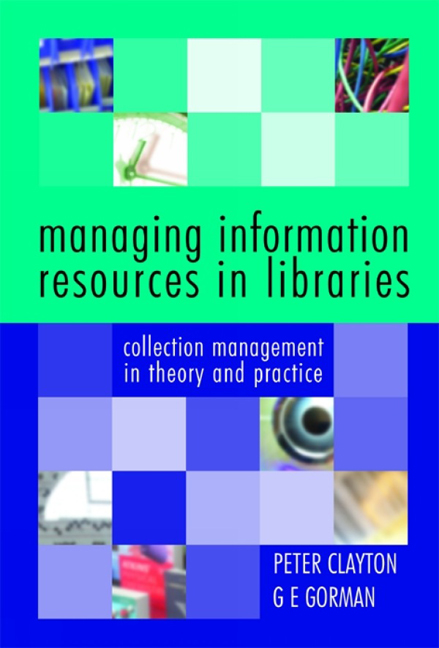Book contents
- Frontmatter
- Contents
- About the authors
- Preface
- 1 Managing information resources in context
- 2 Collection management and collection development policies
- 3 Conspectus
- 4 Resource sharing and co-operative collection development
- 5 Selection: policies and procedures
- 6 Selection resources
- 7 Acquisitions processes and procedures
- 8 Budget management
- 9 Collection evaluation and review
- 10 Preservation and weeding
- The literature of collection management Adela Clayton
- Index
2 - Collection management and collection development policies
Published online by Cambridge University Press: 08 June 2018
- Frontmatter
- Contents
- About the authors
- Preface
- 1 Managing information resources in context
- 2 Collection management and collection development policies
- 3 Conspectus
- 4 Resource sharing and co-operative collection development
- 5 Selection: policies and procedures
- 6 Selection resources
- 7 Acquisitions processes and procedures
- 8 Budget management
- 9 Collection evaluation and review
- 10 Preservation and weeding
- The literature of collection management Adela Clayton
- Index
Summary
Focus questions
• What is the distinction between collection management and collection development?
• What are the advantages and disadvantages of having written collection management and collection development policies?
• How should such policies be affected by the increasing availability of electronic information?
• What sections might be included in collection management and collection development policies?
• How should a library go about formulating such policies?
Collection management, collection development or both?
In the 1960s and 1970s, in many countries libraries and library collections experienced unprecedented growth. This was a time of staff expansion to cope with the growing challenge of creating larger collections. It was also the era of subject and area studies specialists: professionals appointed specifically to develop collections in their own areas. The growth of physical collections necessitated the appointment of staff with particular commitments and expertise to build and develop well-tuned collections. Today the overall level of resources going to libraries is in decline, and certainly shrinking in comparison with the overall availability of information, and one wonders whether staff expertise and skills are keeping pace with this change. As noted in the previous chapter, technology that gives readers access to information without relying on a specific collection is also changing the shape of what we do. ‘Collection development’ has been replaced by ‘collection management’ as the approved professional term, but in fact the two components continue to exist.
In some of the most widely used literature in this field there seems to be considerable confusion about the distinction between the two concepts. Thus Edward Evans, whose views are generally to be respected, has inadequately defined collection management as the activity that ‘relates to a library environment (in the traditional sense) where the emphasis is on collecting materials produced by other organizations’, as distinct from ‘information resources management’, which deals with both internally and externally produced resources. While in our view this is an incorrect definition, Evans’ gloss helps to recover some ground: ‘both terms incorporate all aspects of collection development … plus such managerial aspects as budget planning and control, staffing and physical facilities’.
- Type
- Chapter
- Information
- Managing Information Resources in LibrariesCollection Management in Theory and Practice, pp. 16 - 36Publisher: FacetPrint publication year: 2006



